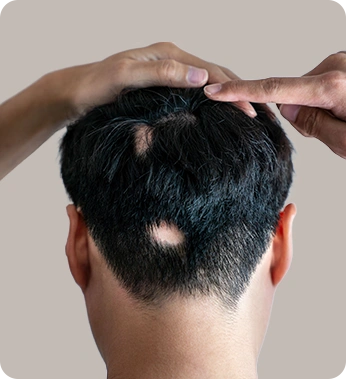Alopecia Areata
Treatment in Homeopathy
Your Natural Solution for Hair Regrowth
Book your Appointment
Dr Batra’s® treatments offer a holistic approach, promoting natural hair growth by helping individuals regain their confidence without being defined by alopecia
In India, alopecia areata affects about 12.81% of those experiencing hair loss, impacting both genders equally and commonly starting before age 20. This condition is more than just hair loss; it significantly challenges self-esteem and overall well-being
Early signs of Alopecia include sudden patches of hair loss, noticeable thinning, increased hair fall, and changes in hair texture or density.
Root Cause Approach
Addresses immune dysfunction, stress, and hormonal imbalances
Non-Invasive & Safe
No harsh chemicals or side effects. Suitable for all age groups
Sustainable Results
Supports natural, lasting hair regrowth with no dependency


To achieve optimal results with alopecia homeopathic remedies, it is essential to follow a comprehensive treatment. Homeopathy treats all types of Alopecia. Here’s a step-by-step process:
Scalp Health Assessment
Evaluate the scalp condition and hair loss pattern
Personalised Medication Plan
Homeopathic remedies customised for your specific symptoms and triggers
Nutrition and Diet Counseling
Get advice on nutrient-rich & hair-friendly foods
Stress Management Techniques
Use homeopathic remedies to maintain emotional balance and reduce anxiety
Lifestyle Tips
Get experts advice to avoid harsh hair treatments and maintain scalp hygiene

For those seeking expert guidance, Dr Batra’s® is a trusted name in offering homeopathy treatment for alopecia areata. Here’s why:
Comprehensive Scalp Analysis & Diagnosis
Ensures accurate alopecia type and progression assessment
Personalised Treatment Backed by AI Technology
Artificial Intelligence (AI) analyses the data of over 15 lakhs past patients to identify similar cases and customise treatment approaches
Decades of Expertise in Homeopathy
Over 40 years of treating hair loss with proven success
Proven Treatment Outcomes with Success Stories
Thousands of satisfied patients attest to their effective care
Medically reviewed by

Dr. Akshay Batra
26+ years of experience
Alopecia is more than just hair loss. It is an emotional journey that leads to bald patches on the scalp or other parts of the body. Homeopathy effectively addresses alopecia areata, totalis, and universalis. Homoepathy treatments are safe, gentle and effective, providing lasting relief to patients.
Alopecia Areata:
Early signs of alopecia are typically noticed as small, round patches of hair loss that appear suddenly
Alopecia Totalis:
Complete scalp hair loss, often progressing from untreated Alopecia Areata
Alopecia Universalis:
Total loss of body hair, including eyebrows and eyelashes, indicating an advanced autoimmune condition
Mild cases may show improvement in weeks, while severe conditions of alopecia areata may take months. It works gradually, addressing internal imbalances for long-term recovery. Patience and consistent follow-ups are essential for visible and sustainable results.
Absolutely, homeopathy is safe for children. The remedies are natural, non-toxic, and gentle, making them suitable even for infants. They work by stimulating the body’s self-healing mechanisms without harsh chemicals, ensuring safe and effective treatment for conditions like alopecia areata.
Homeopathy minimises recurrence by treating the root causes of alopecia areata, such as autoimmune issues or stress. Once internal balance is restored, the chances of relapse reduce significantly. Maintaining a healthy lifestyle and completing the full course ensures lasting results.
Yes, homeopathy can complement other treatments without side effects. It supports holistic healing, working alongside conventional medicine, supplements, or therapies. For alopecia areata, combining treatments under expert supervision often enhances recovery and promotes overall well-being.